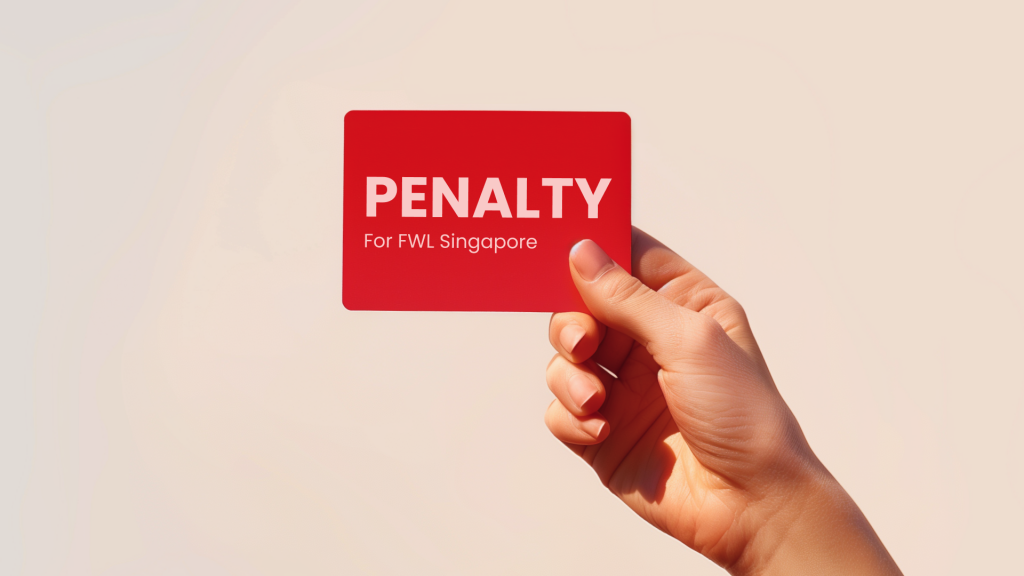For many industries around the world, foreign labor is the backbone of their workforce. And it’s no different in Singapore, where sectors ranging from manufacturing to Information and Technology need a combination of both manual labor and skilled, niche experts.
But an over-reliance on foreign labor can lead to an unbalanced workforce and put the squeeze on local talent. That’s one of the reasons Singapore imposed its Foreign Workforce Levy (FWL), which regulates the number of foreign workers Singapore employers can have, and charges them accordingly.
The FWL Singapore has a few different components, and the penalties for non-compliance can be stiff. Here, we’ll dive into the components you’ll need to consider, the details of a levy waiver for work permit, and the obligations you’ll need to meet.
What is the foreign worker levy?
The FWL Singapore is a fee employers need to pay when they hire foreign workers holding Work Permits or S Passes. In essence, this levy for work permits is meant to limit the number of foreign workers in Singapore, and incentivize employers to prioritize hiring local talent.
Despite that, the FWL Singapore isn’t “anti foreign labor” at all–it’s more about striking a balance between local and foreign talent, with rebates and even levy waiver for work permits available for industries that require a great deal of manual labor (like construction).
And the FWL Singapore isn’t only based on the sector of an organization, its rates vary depending on factors like skill level and nationality of the foreign worker. Employers are required to pay the levy for work permit on a monthly basis to the Singaporean government. Failure to do so will incur penalties or legal repercussions—something you’ll definitely want to avoid if you’re hiring foreign labor. That’s why understanding the FWL Singapore is essential as it will directly affect your salary budget and hiring decisions.
Read next: HR’s Guide to Singapore Hiring
What are the factors affecting FWL Singapore?
As we mentioned above, the FWL Singapore has a lot of factors that determine how much you pay.
Sector
Different industries have different levy for work permit rates based on the sector’s demand for foreign labor and its impact on the local workforce. For example, sectors that require specialized skills or expertise (like technology and healthcare) will have higher levy rates to encourage employers to hire local talent and invest in training programs.
On the other hand, industries facing labor shortages or rely heavily on foreign manpower, like construction and hospitality, will have lower levy rates to support their workforce requirements.
Worker’s skills
The FWL Singapore rates will differ based on the skill level of the foreign worker you’re looking to hire, with higher-skilled workers typically subject to lower levy rates. Skilled professionals, such as engineers or IT specialists, may earn higher salaries and possess in-demand skills, leading to lower FWL Singapore payments.
Monthly salary
The FWL Singapore rates vary depending on the monthly salary of a foreign worker, with higher salaries frequently associated with lower levy rates. If you’re offering competitive salaries to foreign workers, you’ll probably benefit from lower levy obligations, as higher wages reflect your commitment to hiring skilled and experienced professionals who contribute positively to the Singaporean economy.
Dependency ratio ceiling (DRC)
The DRC refers to the maximum permitted ratio of foreign workers to the total workforce in your company. If your organization exceeds this ratio, you might face higher levy rates meant to deter your company from hiring excessive foreign labor. By imposing limits on the number of foreign workers (relative to local talent) in a company, Singapore aims for a balanced workforce which safeguards job opportunities for its locals.
With these factors in mind, you can plan your hiring strategy for a cost effective and balanced workforce. While it may seem counterintuitive, spending more to hire skilled employees at higher salaries can be a viable strategy for keeping FWL Singapore costs reasonable, and accessing high-caliber foreign talent.
What are employer obligations for FWL Singapore?

As an employer in Singapore, you are subjected to several different obligations dealing with the FWL Singapore, put in place by the government to ensure compliance with local labor laws, and promote fair work environments. Key examples include:
Timely payment
Your organization will be responsible for promptly paying the FWL Singapore via a General Interbank Recurring Order (GIRO), usually on a monthly schedule. Failure to meet payment deadlines will result in fines or even legal consequences, so making sure your company pays its levy for work permits on time should be a top priority.
Record keeping
Your organization will also need to maintain accurate records about the employment of foreign workers, including details of their work permits, residency status, and levy for work permit payments. These records are essential documentation for regulatory compliance audits and help maintain transparency in labor management practices. Having a system like an HRIS which centralizes record keeping while keeping documents secure and accessible is a great addition to your tech kit if you’re employing foreign workers in Singapore.
Compliance with DRC
As we noted above, you’ll also need to pay careful attention to the DRC. By measuring the ratio of local to foreign workers, and abiding by the prescribed ratio, you’ll maintain a balanced workforce composition and avoid the fines and penalties associated with employing an excess of foreign labor.
By fulfilling these obligations, your organization will demonstrate its commitment to upholding ethical labor practices, maintaining regulatory compliance, and contributing positively to Singapore’s economic and social fabric.
The key is proactivity—rather than wait until the last minute to pay the FWL Singapore, or scramble to react to an audit, HR tools can help you stay ahead of the game and keep close tabs on the makeup of your workforce, payment schedules, and essential documents.
Who is eligible for FWL Singapore rebate?
If your organization operates in the Construction, Marine Shipyard, and Process (CMP) sectors, you may be eligible to levy waiver for work permit when it comes to paying FWL Singapore.
This rebate scheme aims to provide financial relief to employers in industries with higher reliance on foreign labor, with the intention of supporting Singaporean business sustainability and competitiveness. Here’s a breakdown of eligibility criteria and rebate details:
Rebate applicability: The levy waiver for work permit is applicable exclusively to employers operating within the CMP sectors listed above. These industries often require a significant workforce, including foreign labor, to meet the demands of their day to day operations and project requirements.
Work permit categories: The rebate amount or levy for work permit varies depending on the specific work permit category of foreign employees hired by an organization. The two primary categories include:
- Work permit holders: Employers who hire foreign workers under the Work Permit scheme may qualify for FWL rebates based on government criteria and sector-specific considerations. For example, the rebate or levy waiver for work permits you’d qualify for in the construction sector would likely be higher due to the labor-intensiveness of construction work. Similarly, in the manufacturing sector, rebates might be higher for employers that require a greater deal of manual labor and might have better FWL rebates than those that rely on automation.
- S pass holders: The details are similar for S Pass holders—organizations employing foreign professionals, technical personnel, and skilled workers under the S Pass scheme may be eligible for FWL rebates or levy waiver for work permit subject to sector-specific guidelines and compliance requirements. In the IT sector, these might include rebates for companies focused on training and education, or hiring highly niche specialists from foreign talent pools.
The Singapore government offers rebates and levy waivers for work permits tailored to specific sectors and work permit categories, aimed to help with the financial burden on employers in industries vital to the nation’s economic growth and development.
These targeted incentives and levy for work permit support the Singapore government’s workforce management objectives while also building industry resilience and sustainability, despite a diverse and change-prone business landscape.
What are the penalties for FWL Singapore?

Singapore is known around the world for its relatively strict legal system, and this extends to its expectation of FWL Singapore compliance. Failure to meet these requirements could result in several different penalties for organizations hiring foreign labor in Singapore. Here are the penalties you’re going to want to avoid when working with the FWL Singapore:
Late payment penalty
If your organization fails to make on-time FWL Singapore payments, it will incur late payment penalties. You’ll be charged a late payment penalty of 2% per month on your outstanding payment or a minimum of $20, whichever is higher. The total late payment fine is capped at 30% of the outstanding levy.
Cancellation of work permits
In cases of serious or repeated non-compliance with FWL Singapore regulations, authorities have the ability to cancel the work permits of foreign employees working for the offending employer. Work permit cancellations have significant implications for both employers and affected workers, including potential disruptions to operations and employment status. Compliance with FWL Singapore is extremely important as it can put your workforce and their livelihoods in jeopardy.
Denial of future work permit applications
For organizations found to be in serious or repeated breach of FWL Singapore regulations, they could face restrictions or outright denial when applying for future work permits. Authorities tend to scrutinize applications from non-compliant employers more closely, considering past compliance records and how well they’ve stuck to regulatory requirements. In other words, it is important to ensure compliance to FWL Singapore regulations as it might make it more difficult for your organization to hire foreign labor on an ongoing basis.
Ban on applying for work permits
In the most severe cases of non-compliance or persistent violations, authorities may impose bans on employers, preventing them from applying for work permits altogether. These bans serve as the most intense deterrent against repeat offenses and underscore the seriousness of regulatory breaches.
If your organization hires foreign workers in Singapore, prioritizing compliance with FWL Singapore regulations is crucial. Adhering to payment deadlines, fulfilling reporting obligations, and staying informed about relevant changes to regulations are all essential steps to maintaining compliance.
Stay Informed and Compliant with Omni
It is clear that the FWL Singapore is a crucial aspect of managing foreign manpower and you as an employer must comply with levy for work permit regulations to avoid risk of fines and ensure smooth business operations.
Omni’s all-in-one HR software provides a comprehensive solution for modern businesses to manage their workforce effectively, including foreign workers. By using Omni, you can automate calculations, ensure timely payments, and maintain compliance with Singapore’s regulations. With payroll solutions that support SGD and pay schedules, Omni offers an entire suite of solutions to make your payroll system Singapore seamless.
Book a demo with us today and we’ll walk you through the platform’s capabilities and demonstrate how Omni can transform your HR processes, saving you time, reducing administrative burdens, and enhancing overall efficiency.


